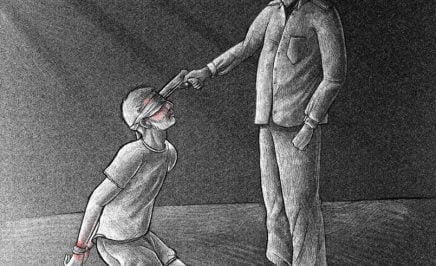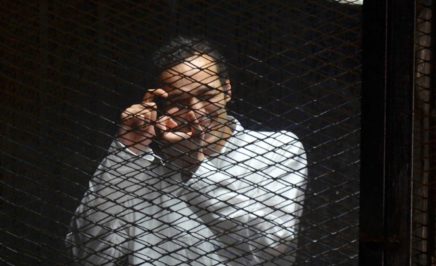An Egyptian military court has sentenced eight individuals, all civilians, to death and another 18 to lengthy prison terms, after a grossly unfair military trial that relied on “confessions” extracted under horrific torture including defendants being whipped with a burning cloth.
Affront to justice
“This verdict is an affront to justice and must be quashed immediately,” said Magdalena Mughrabi-Talhami, Amnesty International’s Regional Deputy Programme Director for the Middle East and North Africa.
“Sentencing to death men who were tortured into ‘confessions’ is an egregious injustice, even by the degraded standards of Egypt’s justice system. They must receive a fair trial before an ordinary civilian court that meets international standards and excludes torture-tainted evidence, without the recourse to the death penalty.”
“Sentencing to death men who were tortured into ‘confessions’ is an egregious injustice, even by the degraded standards of Egypt’s justice system.”
Magdalena Mughrabi-Talhami, Amnesty International
The 26 convicted defendants were facing charges that included belonging to a banned group – namely the Muslim Brotherhood – possession of firearms and explosives and obtaining classified military information without authorization. Nineteen of the defendants were present in court, with the remaining seven tried and convicted in absentia. Of the eight sentenced to death, six were present. Under Egyptian law, the President has to ratify executions within 60 days of the verdict.
Forced disappearances and torture
Egyptian security forces arrested the 19 defendants between 28 May and 7 June 2015 and held them incommunicado in military intelligence detention centres, under conditions of enforced disappearance, for up to 46 days. During this time, military intelligence officers subjected the defendants to electric shocks including in the genitals, whipping, burning and suspension by the wrists which were handcuffed behind their backs.
Lawyers and family members told Amnesty International that the defendants bore torture marks all over their bodies including bruises and burns, as well as injuries to the hands as a result of torture. According to lawyers who were present at the trial, all the defendants told the court about the torture and other forms of ill-treatment and requested that the court formally refer them to a forensic authority to authenticate their claims. This request was ignored.
“The Egyptian military has an appalling record of sentencing people to death and executing them on the basis of ‘confessions’ extracted under torture. This flies in the face of both Egyptian and international law. The authorities must halt the execution of these six men,” said Magdalena Mughrabi-Talhami.
“The Egyptian authorities must conduct an independent investigation into the incommunicado detention and torture of the defendants and bring those responsible to justice.”
“The Egyptian authorities must conduct an independent investigation into the incommunicado detention and torture of the defendants and bring those responsible to justice.”
Magdalena Mughrabi-Talhami, Amnesty International
Families searching for loved ones
The families of the men told Amnesty International during the period when their relatives were subjected to enforced disappearance they had searched police stations, prisons, and prosecutor offices but the authorities denied they were in custody. The families also sent telegrams by post to the Public Prosecutor, the Minister of the Interior and the Minister of Justice but received no response.
Amnesty International found that 18 of the defendants were held incommunicado in the Military Intelligence headquarters in Nasr City, Cairo, while one defendant was held in the notorious al-Azouly military prison inside al-Galaa Military camp in Ismalia.
Most of the families only found out that the detainees were in military custody on 10 July, when they saw a Ministry of Defence video on television declaring that they arrested “the most dangerous terrorist cell” in Egypt. The video included footage of detainees “confessing” to belonging to banned groups and attacking military institutions.
Amnesty International has seen the eight-page testimony of the intelligence officer who prepared the case. The court asked the officer 68 questions including about the circumstances of the arrest of the defendants, evidence against the defendants and their relationship with each other. The military intelligence officer responded to at least 60 of the questions saying either “I don’t remember” or “everything is documented in the official investigations of the case”.
Background
Egyptian courts, civilian and military, handed down hundreds of death sentences to defendants convicted of “terrorism” and other charges related to the political violence that followed former President Mohamed Morsi’s ousting in July 2013. Those executed included prisoners sentenced after grossly unfair trials. At least seven men were executed last year in relation to political violence; one on 7 March after an unfair trial. Six men executed on 17 May had been sentenced to death after a grossly unfair trial before a military court, despite evidence that military intelligence officers tortured them to force them to “confess” to capital offences and falsified their arrest dates in official documents.
Amnesty International opposes the death penalty in all cases without exception, regardless of the nature or circumstances of the crime; guilt, innocence or other characteristics of the individual; or the method used by the state to carry out the execution. On 6 April, Amnesty International launches its 2015 Annual Death Penalty report providing an overview of death penalty developments and statistics from across the globe.









